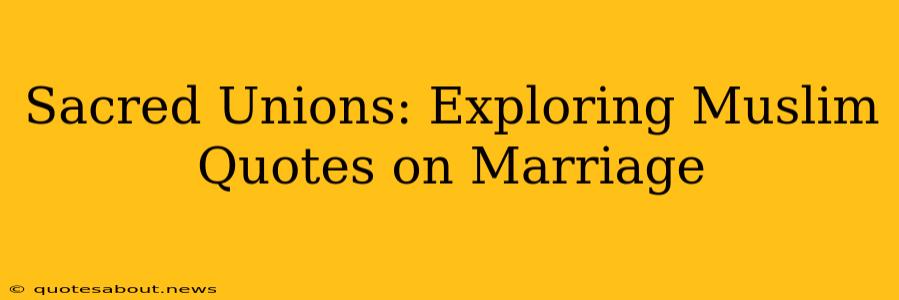Marriage, in Islam, is considered a sacred institution, a divinely ordained path towards spiritual growth, companionship, and the continuation of humanity. Far from being merely a social contract, it's viewed as a profound partnership built on love, respect, and mutual commitment, guided by the teachings of the Quran and the Sunnah (prophetic traditions). This exploration delves into insightful Muslim quotes on marriage, illuminating the profound wisdom embedded within Islamic teachings on this sacred union.
What are the main teachings of Islam about marriage?
Islamic teachings on marriage emphasize the importance of building a strong foundation based on faith, compassion, and mutual understanding. The Quran highlights marriage as a means of achieving tranquility and avoiding illicit relationships. It encourages couples to maintain kindness, compassion, and patience within the marital bond, highlighting the importance of shared responsibility and mutual support. The Prophet Muhammad (peace be upon him) stressed the significance of treating one's spouse with respect, kindness, and affection, emphasizing that a husband and wife are partners in this life journey. The teachings stress the importance of choosing a spouse wisely, prioritizing faith and character over superficial qualities.
What does the Quran say about the importance of marriage?
The Quran doesn't directly define marriage in a single verse, but it underscores its importance through numerous verses that highlight its purpose and benefits. Key themes include the creation of spouses as a source of comfort and tranquility (Quran 7:189), the sanctity of marriage as a means to avoid forbidden relationships (Quran 23:5-6), and the importance of fulfilling marital rights (Quran 4:19). The emphasis on building strong families rooted in faith and mutual respect permeates various Quranic passages. These verses don't just present marriage as a social contract, but rather, as a sacred pact with profound spiritual implications.
How does the Sunnah guide Muslim marriages?
The Sunnah, the Prophet Muhammad's (peace be upon him) sayings and practices, offers practical guidance on navigating the complexities of marriage. His teachings emphasize the importance of pre-marital counseling and seeking guidance from trusted individuals before marriage. The Prophet's example shows the importance of treating one's spouse with respect, tenderness, and affection. His emphasis on consultation and dialogue within the marriage highlights the importance of shared decision-making and mutual understanding. Narrations describe the Prophet's own marital life as a model of love, respect, and companionship, demonstrating the principles of a successful and fulfilling Islamic marriage.
What are some common challenges faced by Muslim couples today?
Modern challenges, such as cultural shifts, societal pressures, and conflicting expectations, can strain even the strongest marriages. Balancing traditional values with modern lifestyles, navigating disagreements, and managing expectations in a rapidly changing world are common hurdles. Furthermore, financial pressures, family interference, and lack of communication can also contribute to marital challenges. Understanding these potential difficulties and actively working to overcome them through open communication, mutual understanding, and seeking guidance from Islamic sources are vital for maintaining strong and fulfilling marriages within the Islamic context.
How can Muslim couples strengthen their marriages?
Strengthening a Muslim marriage requires a proactive and committed approach. Regular communication, mutual respect, and shared religious practices are foundational elements. Seeking knowledge from Islamic sources on marital relationships, engaging in acts of kindness and affection, and prioritizing quality time together are crucial aspects. Seeking guidance from knowledgeable religious scholars or marital counselors can help address challenges and strengthen the bond. Continuous effort, mutual support, and a shared commitment to Islamic principles are key to building a lasting and fulfilling marriage.
Conclusion:
Muslim quotes on marriage reflect a rich tapestry of wisdom and guidance, emphasizing the profound spiritual, emotional, and social significance of this sacred union. By embracing these teachings, Muslim couples can strive to create harmonious and fulfilling relationships grounded in faith, love, and mutual respect, building strong families that contribute positively to society. The journey of marriage, as highlighted in Islamic teachings, is not merely a path towards companionship, but a journey of shared spiritual growth, a testament to the beauty and blessings found in a life lived in accordance with divine guidance.

